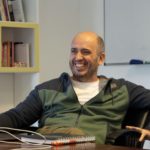Anticipation is an extraordinary thing. It’s like that feeling in your stomach before a rollercoaster drops, or when your mouth waters at the sight of your favorite treat. Sometimes it’s less clear, like the excitement of dreaming up possibilities or the fear of things that might never happen. In any case, anticipation doesn’t mean things will actually occur, but that they exist within the realm of what’s possible. And that’s totally different.
I use scenario planning to lay out all those possibilities before us. This strategic planning method helps us make plans that are flexible and adjustable as we learn more about the development of events. It combines different types of facts, from demographics to geopolitics, to help us envision different stories that might arise.
Let’s dive into the history of scenario planning for a moment because it’s truly something! Herman Kahn, a member of the RAND Corporation in the 1950s and 1960s, introduced the term. He developed a technique of describing the future in stories as if written by people in the future. Writer Leo Rosten suggested the term “scenario” based on Hollywood terminology, and Kahn adopted it because he liked the emphasis on creating a story, not just forecasting. This technique proved invaluable during the Cold War, helping Kahn illustrate wildly different outcomes for politicians and decision-makers. This resonates with me and with Arionkoder, where storytelling is vital to how we work and generate results by writing new stories with our partners and community.
Scenario planning invites us to classify events in 4 Ps:
- Possible: Those that might happen, the widest range.
- Plausible: Those that could happen, given the uncertainties.
- Probable: Those likely to happen.
- Preferred: Those we want to happen.
By understanding the possible scenarios, we can get a broad idea of how things could go. Detecting which are plausible narrows it down to those with a higher probability. Then, we look at the probable scenarios: that’s where, through reverse engineering, we either prepare for their effects if we can’t control them, or take actions to make our preferred outcomes more likely. We can adjust our scenarios and predictions as time progresses and events unfold.
Predictions also change depending on time horizons. If I had to predict whether self-driving cars would become the norm tomorrow, my answer would be very different from predicting their widespread adoption by 2040. While it’s true that sometimes things can come out of seemingly nowhere, we can go a long way using this planning mechanism. It prevents us from being reactive and as a result, slowed down, instead of ready to strike or defend sooner. And I think this is something all companies should examine, even if it takes time and hard work, because your immediate strategy is very different from looking at possible scenarios coming your way.
Consider the example of returning to the office (RTO). Office work has been very pendular, swinging from full-time office presence to completely remote during the pandemic, and now finding a balance in hybrid work. This market correction shows how we proactively adapt to changing circumstances. As a leader, my job is to prepare and anticipate the consequences of these changes, so we can gain an edge. Whether it’s logistical challenges, operational changes, new locations, or transforming current dynamics, scenario planning helps us be ready if and when the time comes. And even if things don’t go as imagined and some plans are scrapped, being prepared gives us a head start over the competition.
Beyond RTO, prominent market players use scenario planning to make informed decisions. Warren Buffet, for example, uses it to navigate the complexities of the financial world. Markets where money begets money rely heavily on these scenarios for success. Intuition alone isn’t enough; it must be accompanied by observing trends, historical data, and global changes. This way, scenario planning abilities evolve and improve, giving way to more accurate predictions every time.
At Arionkoder, I ask my leadership team to include scenario planning in their views. Our direction is clear, but the path to get there is constantly evolving. By thinking this way, our future task force helps us open new branches of our future as a strategic action point.
Now it’s your turn to plan ahead. I hope you start viewing the world this way and live in awe of the infinite menu of possibilities before us, just like I do.
